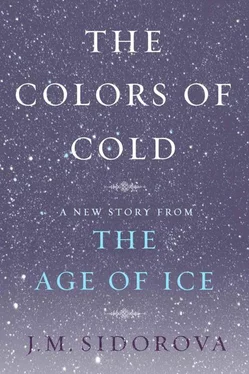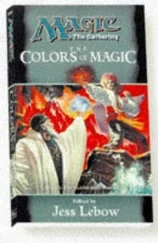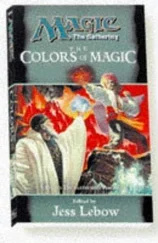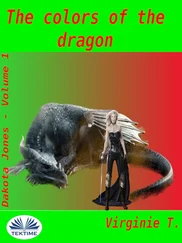She shrugs—and her breasts stir in double negation.
I think I do not need to touch her, only to keep looking at her. I consider the biblical Onan. Consider snatching her and taking her someplace more convenient. Say, “Come here.” Stretch out my hand, snow in it, for her to see—as if it is an explanation for my imminent action. My mouth is dry. “Look at it! What do you see?” She cranes her neck, her eyes dart from my hand to my face and back. “Snow?” she says.
“Do you see it is not melting?!”
She returns a wary stare as the few vestiges of her snow slip most tantalizingly down her curves.
“Pick up my coat, wrap yourself.”
She obeys.
I grab her.
An earsplitting scream erupts from the sweat lodge. Startled, I release my prey and she runs away. My greatcoat falls into the snow. I see a crowd has formed, watching me from the top of the hillock, men and women both. I flee to my sleigh, whip the mare, she bounces up and down on all fours wildly before she gets traction. As she widens her gallop under my whip, she hits the sleigh with her hind hooves—the shaves too short indeed—and so she scares herself into a frenzy. The sleigh overturns as the road curves away from a pond, I am dumped, the pull of the shaves and my clutching onto the reins bring the mare down, and both of us wind up sprawled below the road, in deep snow.
Lying there in that snow, not knowing whether to laugh or cry, I stare at the empty environs, at the sky splintered by an occasional crow. Then I roll over and, gritting my teeth, succumb to Onan’s ways.
I growl angrily at my own hand and stare down—in a curious feeling of animalistic parity—the mare who is trying and failing to get on her own feet. Once I’m done I get up, unharness the mare, and let her climb out of the hole she’d made. I trudge to the pond and sit. There are sullen willows and crows that strain themselves cawing, a fisherman’s crooked shack on the far side. That’s how it is going to be, I say to the pond. God help me .
The mare and I walk back to the mansion, where I learn the latest news: Andrei and his wife will arrive in days. He will stay just long enough to make sure she is settled, then leave for the war with the Ottoman Turks. How fortunate! Instantly, my existence receives new purpose: I will win the wife’s trust and she’ll tell me everything I wish to know about my brother but will never learn from him directly because I won’t ask and he won’t tell.
Is he cold? Like me?
* * *
God help us.
I watched, a part of the welcome committee, as they climbed out of a kibitka. My brother first, a solid man now, square-shouldered and unhurried, and then—the wife.
“What are you doing here?” was Andrei’s greeting for me. No one had told them, apparently.
“On leave,” I relished saying. “For the service I rendered to the empire. Haven’t you heard?” Oh how I enjoyed seeing his face turn dour while I gallantly mentioned my inoculation, looking not at him but mostly at his wife. Anna, wasn’t it? Her hair was very dark and so were her eyes, her skin was porcelain-white. But she was no beauty: her nose a trifle too pointy, her mouth too small. Her smile was tentative. She wouldn’t be hard to win over.
“We’ve heard of your service, ” Andrei said and all but carried Anna inside.
Andrei made it known that he did not like my staying in Velitzyno. I overheard it. I eavesdropped by the door to Father’s study; they had to be talking about me. The floorboards creaked and voices rose and fell. Andrei’s, agitated: he … irregular behavior … ill-natured … is said to be … Father’s, irate:… me to do, kick him out? … so he takes it to town?
An hour later, Father called me in. I walked into his study with a sardonic smile on my face: See if I care! He surprised me by saying, What was that faux pas you had performed on that Matryona woman? I said, Matryona who? — The peasant woman you are rumored to have attacked, he said. Attacked?! I flared. There was no attack! Where’s the damage?
He erupted in a gurgling cough. He grumbled, We don’t need disturbances here .
I shrugged, ready to leave. Is that all?
It was.
* * *
Oh, I knew: never had Andrei been so reluctant to leave this old house as he was now. I saw him talking to Anna. She was seated in an armchair and he was standing over her as if he were a teacher and she a pupil who needed correction. I knew he had indoctrinated her: Stay away from Alexander! He is a troubled man!
I could just tell. And so I waited for Andrei to abide the call of duty and leave. I waited through all those little silences, and forks dropped at dinner, and the glances Anna cast about as if—but for an instant—she was deeply and profoundly disoriented.
Oh, I watched her, yes, I looked for ways of entry into her soul. She was twenty-two but her calm demeanor made her appear older. Her dark eyes were sad. I knew just what to ask her come the right time: Why are you unhappy?
* * *
Andrei left.
I hunted her. Day to day, from fireplace to fireplace, parlor to parlor, among ladies playing cards or taking cordials or altering clothes or tasting currant preserves or knitting or finding each other’s soft spots and there inserting their dainty needles (Anna would respond with a polite—or clueless—smile). I chased her among children at play, where she would take part dreamily, while younger nephews blushed at older nieces, and nieces twittered into each other’s ears in their little-girls’ French.
She avoided being alone with me—she was a good pupil—but no matter. I could converse with her—or about her—in others’ company. How is my sister-in-law doing today? My lady cousins, I knew, would supply the context: Annichka, dear, your brother-in-law seems so taken by you … runs in the family, no doubt … although no two brothers could be as different as these … and this one is a bad, bad boy, they say …
I piqued her interest. Soon she would at least sit with other ladies and listen to me telling stories about Andrei’s childhood: Do you know he wanted to be Iliya of Murom when he was a kid? … Do you know he wanted to be a Leib Guard so badly that he stretched himself taller? … He wasn’t always as serious as now … Does he ever smile at you? Is he ever tender?
Splotches of blush would show on her cheeks. “Well, yes. Andrei Mikhailovich is a caring man. Of course he is tender with me.”
And I’d add another little fly to the ointment. “You can call me Alexander. No need for those stuffy patronymics.”
I was engaging in talk of this kind one day when a lackey approached. “Your Nobleship, a situation is downstairs. Kindly attend to it.” I registered Anna’s curious glance upon me before I left to “attend.”
The situation was standing in the backyard, between a chicken coop and a workshop. She had a boy of four, maybe five years of age, clinging to her arm. “For the third day straight she comes,” the lackey commented. “Says you asked for her, stubborn thing.”
Flushed already, I told the lackey to be on his way, then approached her. “Matryona, is it?”
She bowed her head.
“Your child?”
She nodded. “Savva.” And then, holding my stare captive, she headed toward the chicken coop.
Inside, Savva climbed the plank to the roost. “Mama, look—a hen with a cowlick,” and his mother said, “Look for a red one, baby,” and then she opened her greatcoat for me and let out her breasts. The areolae wilted in the cold air. I watched though did not touch myself in front of her—still too shy. But the next time, and the time after that, and later—I was shy no longer.
Читать дальше












